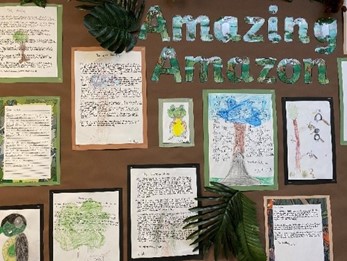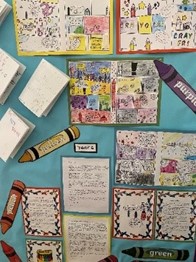Welcome to Writing at Lightmoor
Intent
At Lightmoor Village Primary School, it is our intent to provide the children with the skills and knowledge to become fluent and confident writers. We want to enable pupils to express themselves creatively and imaginatively for a variety of contexts, as they become enthusiastic and critical writers. Across the curriculum, writing brings learning to life as a strategy for helping our children embed their learning and to help them to ‘know more and to remember more!’ We know our children especially enjoy engaging techniques such as drama and role play, which contribute to their ‘author’s voice’. By the end of Year Six, we intend our children to have developed a love of writing and to be able to express their thoughts and ideas clearly and creatively through the written word. We also intend to create writers who can re-read, edit and improve their own writing, and enable pupils to be able to confidently use the essential skills of grammar, punctuation and spelling. At Lightmoor, we set high expectations for all our children to take pride in their work and have a fluent, cursive handwriting style alongside allowing their imaginations to flourish.
Implementation
Writing is evident in every aspect of our curriculum and varying text types are taught throughout the school. The objectives of the National Curriculum are closely followed to ensure that the skills learnt in spelling, punctuation and grammar are embedded and transferred into writing. Lessons are carefully planned so that skills are taught, embedded, revisited and then developed in a sequential way which promotes learning and retention of knowledge and skills. Pupils are given a language rich curriculum and are encouraged and shown how to effectively use interesting and adventurous language in their writing. Our school uses the award-winning ‘Ready, Steady, Write’ planning scheme to shape our writing curriculum. Within that, a writing cycle is followed for each new unit: ‘Immerse, Analyse, Plan, Write’. At every stage, pupils are taught how to reflect on their writing and edit for accuracy and improvement. Teachers throughout the school guide and instruct pupils in several ways in which they can become better writers. For example: pupils will analyse a ‘model text’ to identify the ‘writer’s knowledge’, joint and independent planning for writing takes place and children compose writing collaboratively and independently for various purposes. We expect and encourage children to present their work neatly so fine motor control, letter formation and joined writing are taught throughout the school progressively. Writing is assessed in a variety of ways. Pupils are encouraged to assess their own writing against agreed ‘success criteria’, adults will assess writing against national curriculum expectations and spelling, punctuation and grammar tests occur termly to identify gaps in achievement. By far the most important feedback our children receive is ‘live’ verbal and written feedback during learning time.
Impact
We are proud of the exciting and interesting writing that our children produce through a broad and balanced curriculum. Pupils make good progress from their own personal starting points. By the end of Year Six they are able to write clearly and accurately and adapt their language and style in and for a range of contexts, purposes and audiences. Most importantly, our pupils develop a love of writing and are well equipped for the rest of their education. There are clear end points for pupils in all year groups to achieve age related expectations.


“You can make anything by writing.” – C.S.Lewis
English Lead: Mr Newton
Writing Progression Grids (Reception – Year 6)
